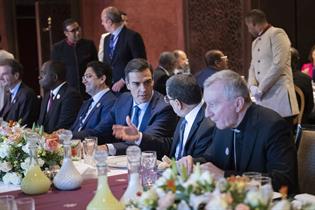Intergovernmental Conference on the Global Compact for Migration
In Marrakesh, Pedro Sánchez says migration should not be used to justify nationalist withdrawals
President's News - 2018.12.10
Images of the arrival of the President of the Government to the Intergovernmental Conference on the Global Compact for Migration | Pool Moncloa / Jorge Villar - 2018.12.10
-
 01:45
Images of the intervention of the President of the Government at the Intergovernmental...
01:45
Images of the intervention of the President of the Government at the Intergovernmental...
-
 00:44
Images of the arrival of the President of the Government to the Intergovernmental...
00:44
Images of the arrival of the President of the Government to the Intergovernmental...
-
 01:07
Images of the meeting between the President of the Government and the Prime Minister of...
01:07
Images of the meeting between the President of the Government and the Prime Minister of...
-
 00:45
Images of the meeting between the President of the Government and the Secretary of...
00:45
Images of the meeting between the President of the Government and the Secretary of...
Marrakesh (Morocco)
The President of the Government, Pedro Sánchez, travelled to Marrakesh for the Intergovernmental Conference on the Global Compact for Migration, at which Member States of the United Nations adopted a non-binding framework for cooperation based on a positive vision of the migration phenomenon, which recognises its potential to create beneficial opportunities for the countries of origin, transit and destination. The text of the agreement also contemplates a shared responsibility for all signatory countries to make migration a safe, orderly, regular and voluntary act in respect of human rights. The process will formally conclude on 19 December in New York when the Global Compact for Migration is endorsed by the United Nations General Assembly and Member States are invited to draw up national implementation plans.
In his speech to the Member States, the President of the Government, Pedro Sánchez, announced that Spain would be signing this Global Compact for Migration and said it represents a "qualitative step forward in effective multilateralism", a principle that steers the policy and action of the Government of Spain and that reflects "the path to be followed for correctly managing migratory flows, international cooperation based on shared responsibility and solidarity". Furthermore, the President of the Government announced that Spain will collaborate on the balanced implementation of the 23 objectives presented in the text and, in terms of specific measures, announced the organisation of an International Conference in Almeria in 2019 to analyse the relationship between desertification and migration, and the implementation of a Strategic Plan on Citizenship and Integration aimed at fostering social harmony, social cohesion and inclusion, which will receive State funding to enable joint efforts with the regional governments and local council authorities.
 Pool Moncloa/Borja Puig de la BellacasaIn his speech, Pedro Sánchez said that the migration phenomenon is a "historic fact", "inseparable from human nature" and a "structural reality that requires strategic long-term management" to enable the design of sustainable and effective strategies for combating irregular migration and its underlying causes, facilitating regular and voluntary migration, and reducing vulnerabilities of migrants. "And it is a global task", he said, stressing that no single country can tackle the migration phenomenon on its own. "Together we can achieve more, it is a responsibility that is shared between the countries of origin, transit and destination", he added.
Pool Moncloa/Borja Puig de la BellacasaIn his speech, Pedro Sánchez said that the migration phenomenon is a "historic fact", "inseparable from human nature" and a "structural reality that requires strategic long-term management" to enable the design of sustainable and effective strategies for combating irregular migration and its underlying causes, facilitating regular and voluntary migration, and reducing vulnerabilities of migrants. "And it is a global task", he said, stressing that no single country can tackle the migration phenomenon on its own. "Together we can achieve more, it is a responsibility that is shared between the countries of origin, transit and destination", he added.
The President of the Government underlined the need to foster the positive aspects of migratory flows and their contribution to the development and well-being of countries, and to properly manage the negative aspects. "I want to be clear on this", said Pedro Sánchez, "irregular migration is not the way forward". He went on to say that we must fight the people and migrant trafficking networks together, as should we combat xenophobic and exclusive narratives. "We must combat the instrumentalisation of migration as an excuse for nationalist withdrawals and the closing of borders. Appealing to hatred and fear of the different only benefits those who use this strategy to obtain political advantage", he said.
The President of the Government concluded by recalling that "we all have a duty to respect human rights and human dignity" regardless of the legal status of the migrant, a principle that steers the migration policy of the Government of Spain. "Let us not make the mistake of forgetting the lessons of the past. Migrants are not at fault, they are in fact the victims", he said.
Non official translation






